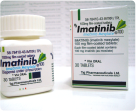Tyronib® (Imatinb Mesylate) 100mg ⇒ Product Glimpse
Tyronib® (Imatinb Mesylate) 100mg ⇒ 10 Tab
Tyronib® (Imatinb Mesylate) 100mg ⇒ 10X10 Tab
Tyronib® (Imatinb Mesylate) 100mg ⇒ 30 Tabs Bottle
Generic Pack
Imatinb Mesylate 100mg ⇒ 10 Tab
Imatinb Mesylate 100mg ⇒ 10x10 Tab
Imatinb Mesylate 100mg ⇒ 30 Tabs Bottle
Uses
Tyronib® (Imatinb Mesylate), is a targeted therapy used to treat certain types of Leukaemia and soft tissue sarcoma, it may also be used to treat other types of cancers as part of research trial.
Tyronib® (Imatinib Mesylate) may be used to treat:
- Chronic myeloid leukaemia (CML)
- A type of acute lymphoblastic leukaemia (ALL) called Philadelphia chromosome positive (Ph+ ALL)
- Gastro-intestinal stromal tumours (GISTs)
- A rare type of soft tissue cancer called dermatofibrosarcoma protuberans (DFSP)
- Other types of cancers as part of a research trial.
Important Safety Information
-
Pregnancy Category D:Imatinib can cause fetal harm when administered to a pregnant woman. There have been post-market reports of spontaneous abortions and infant congenital anomalies from women who have taken Imatinib.
There are no adequate and well-controlled studies with Imatinib in pregnant women. Women should be advised not to become pregnant when taking Imatinib. If this drug is used during pregnancy, or if the patient becomes pregnant while taking this drug, the patient should be apprised of the potential hazard to the fetus. - Nursing Mothers:Imatinib and its active metabolite are excreted into human milk. Based on data from three breastfeeding women taking Imatinib, the milk:plasma ratio is about 0.5 for imatinib and about 0.9 for the active metabolite.
- Pediatric Use:Imatinib safety and efficacy have been demonstrated in children with newly diagnosed Ph+ chronic phase CML and Ph+ ALL. There are no data in children under 1 year of age.
- Geriatric Use: In the CML clinical studies, approximately 20% of patients were older than 65 years. In the study of patients with newly diagnosed CML, 6% of patients were older than 65 years. No difference was observed in the safety profile in patients older than 65 years as compared to younger patients, with the exception of a higher frequency of edema. The efficacy of Imatinib was similar in older and younger patients.
_100mg_logo-header.png)


.png)
.png)
.png)
 - 100mg (10 Tablets).png)
.png)
.png)
 (Imatinib).png)

 100mg_10_tab/Tyronib (Imatinib Mesylate) - 100mg (10 Tablets).png)
 100mg_10_tab/Imatinib 100mg.png)
 100mg_10_tab/TYRONIB_(imatinib mesylate) tablets.png)
 100mg_10X10 tab/Tyronib 100 mg film-coated tablets.png)
 100mg_10X10 tab/Imatinib brands.png)
 100mg_10X10 tab/Tyronib (Imatinib Mesylate) - 100mg (10 Tablets).png)
 100mg_bottle/(Bottle) (Imatinib).png)
 100mg_bottle/imatinib bottle.png)
 100mg_bottle/Tyronib (imatinib mesylate) ... bottle.png)
_ 100mg.png)
